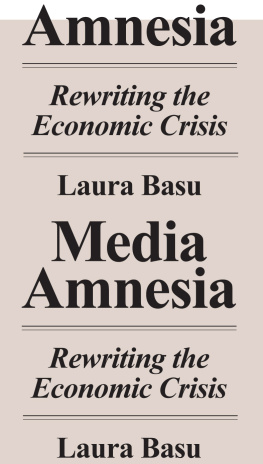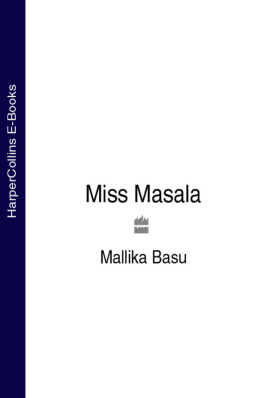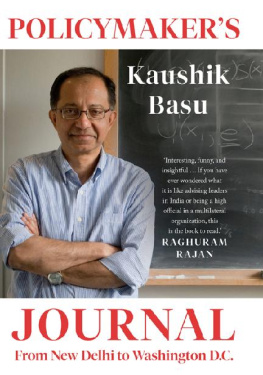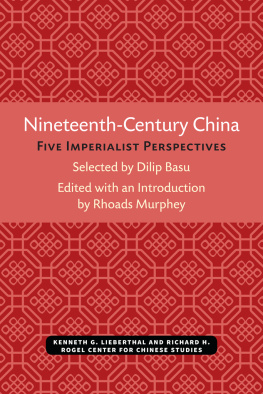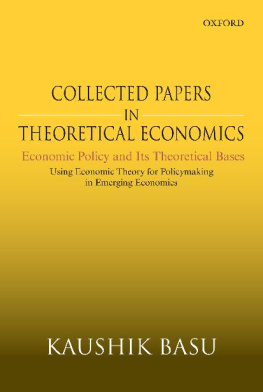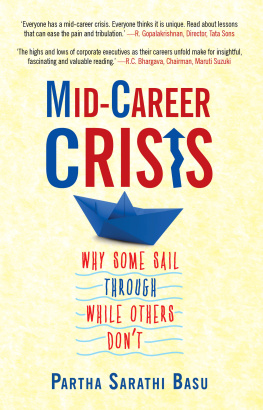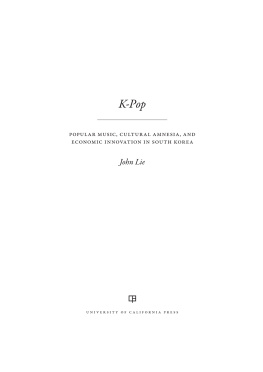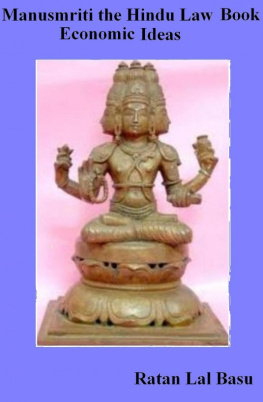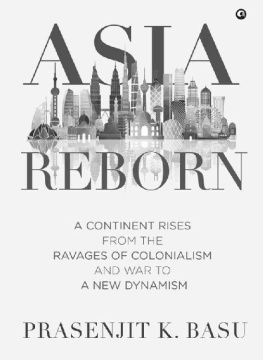Basu - Media amnesia: rewriting the economic crisis
Here you can read online Basu - Media amnesia: rewriting the economic crisis full text of the book (entire story) in english for free. Download pdf and epub, get meaning, cover and reviews about this ebook. City: London, year: 2018, publisher: Book Network Intl Limited trading as NBN International (NBNi);PlutoPress, genre: Politics. Description of the work, (preface) as well as reviews are available. Best literature library LitArk.com created for fans of good reading and offers a wide selection of genres:
Romance novel
Science fiction
Adventure
Detective
Science
History
Home and family
Prose
Art
Politics
Computer
Non-fiction
Religion
Business
Children
Humor
Choose a favorite category and find really read worthwhile books. Enjoy immersion in the world of imagination, feel the emotions of the characters or learn something new for yourself, make an fascinating discovery.
Media amnesia: rewriting the economic crisis: summary, description and annotation
We offer to read an annotation, description, summary or preface (depends on what the author of the book "Media amnesia: rewriting the economic crisis" wrote himself). If you haven't found the necessary information about the book — write in the comments, we will try to find it.
Basu: author's other books
Who wrote Media amnesia: rewriting the economic crisis? Find out the surname, the name of the author of the book and a list of all author's works by series.
Media amnesia: rewriting the economic crisis — read online for free the complete book (whole text) full work
Below is the text of the book, divided by pages. System saving the place of the last page read, allows you to conveniently read the book "Media amnesia: rewriting the economic crisis" online for free, without having to search again every time where you left off. Put a bookmark, and you can go to the page where you finished reading at any time.
Font size:
Interval:
Bookmark:

Rewriting the Economic Crisis
Laura Basu

First published 2018 by Pluto Press
345 Archway Road, London N6 5AA
www.plutobooks.com
Copyright Laura Basu 2018
The right of Laura Basu to be identified as the author of this work has been asserted by her in accordance with the Copyright, Designs and Patents Act 1988.
British Library Cataloguing in Publication Data
A catalogue record for this book is available from the British Library
ISBN 978 0 7453 3790 6 Hardback
ISBN 978 0 7453 3789 0 Paperback
ISBN 978 1 7868 0275 0 PDF eBook
ISBN 978 1 7868 0277 4 Kindle eBook
ISBN 978 1 7868 0276 7 EPUB eBook
This book is printed on paper suitable for recycling and made from fully managed and sustained forest sources. Logging, pulping and manufacturing processes are expected to conform to the environmental standards of the country of origin.
Typeset by Stanford DTP Services, Northampton, England
Simultaneously printed in the United Kingdom and United States of America
This project was funded by a Marie Skodowska-Curie research fellowship supported by Justin Lewis at Cardiff University. My thanks to Justin and to all my colleagues at Cardiff, especially my office mate Joe Cable. Im also grateful for the institutional support Ive received from the Institute for Cultural Inquiry, Utrecht University, the Department of Media and Communications, Goldsmiths, University of London and the Media, Economics, and Entrepreneurship program at the University of Southern Californias Annenberg School for Communication and Journalism.
I want to thank all those who have contributed to this project, by reading chapters or proposals, giving important advice or helping me develop my ideas, especially: Ann Rigney, Astrid Erll, Nello Cristianini, Natalie Fenton, Des Freedman, James Curran, Danielle Rhodes, Fiona May, Christopher H. Smith, Chris Smith, Steve Schifferes, Christian Fuchs, Jonathan Hardy and Marko Ampuja.
A huge thank you to all the journalists who agreed to be interviewed and so generously gave of their time to share their insights and experiences. Likewise the economists, political scientists and activists who helped answer my difficult questions. And to my publisher, Pluto Press, especially my editor Anne Beech.
Thanks to my friends, either for letting me talk endlessly about my work or for providing much needed distraction both types of support have been essential. As always, my wonderful family has been with me every step of the way the LA crew: Jay, Tamara, Alita and Asha, and my unstoppable parents, Ann and Dipak Basu. Most of all, I want to thank the amazing giant, Erik Ros, who has been my partner on this adventure, and whose contribution to this book is incalculable.
On 15 September 2007, the UK experienced its first run on a bank since 1866. Exactly a year later, Lehman Brothers filed the biggest bankruptcy in history. Over the course of 2008, global stock markets plunged nearly 50 per cent, wiping out $35 trillion in financial assets (McNally 2011: 13). Eight major US banks collapsed, as did more than twenty across Europe, many of which were taken over by governments. The entire edifice of the market system seemed to be crumbling before our eyes. Even the Financial Times ran a series on The Future of Capitalism, declaring that The world of the three past decades is gone (quoted in McNally 2011: 14). A decade later, we are still feeling the effects of the banking meltdown, which has cost an estimated $13 trillion in bank bailouts (Blyth 2013: 5), and $50 trillion in asset values worldwide (Harvey 2011: 6). The economic crisis has now morphed into a political crisis, as authoritarian populist figures marshal peoples anger and fear over their precarious finances into nationalist projects.
It is perhaps difficult to remember the sense of sheer panic and confusion in the initial stages of the crisis, swiftly followed by fury at a set of people who had styled themselves as masters of the universe and reaped untold rewards creating what had turned out to be financial weapons of mass destruction (in the words of master of the universe, Warren Buffett). We seem to have grown accustomed to a pervading sense of economic and now political turmoil. Not only that, we seem to have gotten used to the idea that it is we, the ordinary people, who will pay for it, via cuts to public services and lower incomes. Many now even believe that it was public spending that caused the crisis in the first place. It is widely thought that Labour lost the 2015 UK election partly because voters believed it had crashed the economy by spending too much public money, and was not committed enough to tackling the deficit through austerity. Some blame the poor or immigrants for the problems. We seem to have forgotten the origins of the banking meltdown, and its roots in the wider economic system. This is remarkable, not only because of the historical reality of the financial crisis, but because that crisis was all over the news at the time. How has history been so quickly rewritten, what role has the media played in rewriting it, and what effects might this have had for thinking about solutions to the economic problems?
These are the kinds of questions this book will address. It follows the UK news coverage of the crisis from the run on Northern Rock in 2007 until the present day, encompassing the global financial meltdown, the Great Recession, the UK deficit, the eurozone crisis, and falling living standards and rising inequality. It traces the twists and turns by which the media have taken us from a crisis produced by a form of capitalism that has created untold riches for those at the top to a situation in which the majority of people are struggling while those responsible have actually increased their share of global wealth.
In particular, it explores the phenomenon of media amnesia, which has been created purposely by politicians and sections of the press, and is often reproduced passively by the impartial broadcasters and liberal press. As the crisis has mutated over time, it has been continually reframed in the media. With each reframing, certain information is forgotten and other information is added, so that the crisis narrative is fluid, malleable and difficult to grasp in its entirety. It will be shown that this amnesia, which entails the media forgetting its own very recent coverage, has helped trap us in a neoliberal groundhog day. It has legitimised the implementation of the same kinds of policies that helped cause the crisis in the first place. These policies not only hit the poorest hardest but actually transfer resources upwards, from the 99 per cent to the 1 per cent. The strange non-death of neoliberalism (Crouch 2011) since the 2008 crash has been widely observed (Mirowski 2013; Sum and Jessop 2013). This book explores the role of the media in this non-death.
There are three primary characteristics of the media coverage that contribute to media amnesia: a lack of historical explanation; an overly narrow range of perspectives privileging elite views; and a lack of global context. Each of these threads will be teased out through the following chapters. Media amnesia is not limited to the coverage of the economic crisis it can be found in all kinds of reporting (the reporting of the Iraq War springs to mind), and is a defining condition of todays media. The economic crisis provides a rare opportunity to examine media amnesia over a time frame of several years continuously it is one of the only phenomena that has stayed in the media eye constantly for that long a period. The workings of media amnesia in relation to a crisis that has become the backdrop of life for millions is thus the subject of this book.
Font size:
Interval:
Bookmark:
Similar books «Media amnesia: rewriting the economic crisis»
Look at similar books to Media amnesia: rewriting the economic crisis. We have selected literature similar in name and meaning in the hope of providing readers with more options to find new, interesting, not yet read works.
Discussion, reviews of the book Media amnesia: rewriting the economic crisis and just readers' own opinions. Leave your comments, write what you think about the work, its meaning or the main characters. Specify what exactly you liked and what you didn't like, and why you think so.

